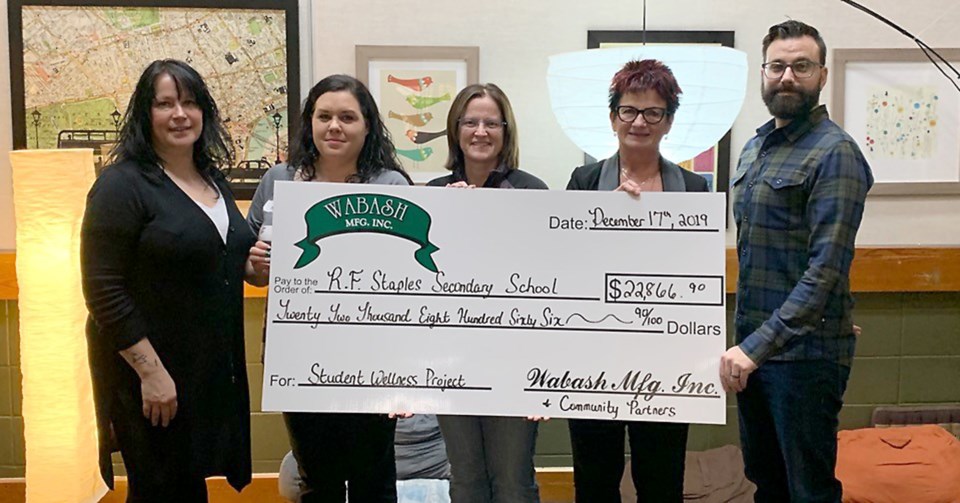WESTLOCK - A large donation of $27,000, most of it from Wabash Manufacturing, has turned hope into reality for the Class of 1979 R.F. Staples alumni who are committed to providing students with mental health facilities.
“We all hoped it and believed in it, but it was Wabash Manufacturing that really stepped up. They heard our plea, and they have so many young staff there (who) really know … now is the time to start talking about it and make the changes for these kids,” said Donnell Wingrove, a 1979 alumni who spearheaded the project.
The volunteers presented to Wabash their proposal for two mental health rooms in the high school, an idea which came after multiple conversations with school staff over the summer about what the needs are and how they can be addressed.
“It’s the same picture (everywhere), kids are struggling with anxiety, depression, bullying, suicidal ideations, stress in families. Kids hear it, they live it, and they’ll express it in different ways,” said Wingrove.
Other alumni involved in the project currently live Burlington or Montana all noticed the universality of mental health disparities in schools.
Before Wabash got involved, the group had raised $4,700.
“Every year, the staff here gather up funds and donate to something in Westlock … Donnell came down here and spoke to us about it,” said Julie Mortensen at Wabash Manufacturing, who explained that the staff was cognizant of the project’s importance to the community.
The response was overwhelming; businesses and individuals raised so much money over three days that Wabash had to close the donations Dec. 16. At that point, $11,433.45 had been raised, which Wabash matched for a total of $22,866.90, a cheque they presented to the school the next day.
Wingrove referred to the rooms as “a place to go.”
That’s really the essence of the project, the spatial delineation for safety, calm, quiet, recollection. One feature of them responds to the physical environment too: they’re meant to be natural and full of light.
A conversation with Maurice St. Denis, counselor at the high school, lasted 40 minutes and barely scraped the surface of what could be achieved with the rooms.
The onset of mental health issues is evident in childhood and early adolescence.
At those ages, it is also combative. But needs vary from student to student because situations differ. Some students might be in crisis with suicidal ideations, others need the space to calm down, gain confidence, reflect – which they might not have otherwise.
“We have students that we check in with for 15-20 minutes and we have students that we will connect with once or twice a week for an hour,” said St. Denis.
He and one other psychologist at the school deal with roughly 400 students a month, 20 students each per day.
Some are repeats, but out of about 700 students total, the numbers show a disparity in service versus need.
The rooms, one of which is now a reality thanks to Wabash’s involvement, can only help undermine some of the agitation in hallways, at home, and on the kids’ cellphones.
“A lot of these kids don’t have consistency in their world,” explained St. Denis.
“(Kids) are navigating a world that is overstimulating, they’re consuming so much stuff via social media. More and more, you see a lot of new … schools that really have a mental health focus, whereas the building that we are working in is still designed for the 20th century.”
In some respects, the cellphone has become another space of agitation with no recourse in the current structure to lessen its effects.
The first room, said Wingrove, is now fully funded. From March 20-30, 2020 they have construction planned, removing carpeting, repainting, and installing furniture.
The group also has a presentation to the Westlock Rotary Club in January, where St. Denis hopes to get some of the students involved too. There is still a ways to go in raising funds for the complete project.



